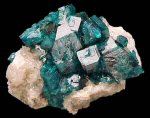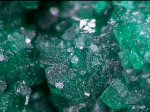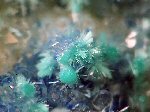Dioptase Mineral Data
General Dioptase Information
Chemical Formula: CuSiO2(OH)2
Composition: Molecular Weight = 157.64 gm
Copper 40.31 % Cu 50.46 % CuO
Silicon 17.82 % Si 38.11 % SiO2
Hydrogen 1.28 % H 11.43 % H2 O
Oxygen 40.60 % O
______ ______
100.00 % 100.00 % = TOTAL OXIDE
Empirical Formula: CuSiO2 (OH)2
Environment: Secondary mineral in oxidized zones of copper deposits.
IMA Status: Valid Species (Pre-IMA) 1797
Locality: Tsumeb and Cochab, Namibia. Altyn Tube, Russia. Link to MinDat.org Location Data.
Name Origin: From the Greek, dia - "through" and optomai - "vision."
Name Pronunciation: Dioptase
Synonym: ICSD 100077
PDF 33-487
Dioptase Image
Images:
Dioptase
Comments: Dark-blue-green crystals of dioptase on matrix. The color of dioptase does not photograph well and must be seen in person to appreciate.Location: Altyn-tyube, Kasakhstan.
Scale: Crystal size 5 mm.© Dave Barthelmy
Images:
Dioptase
Comments: Emerald green lustrous crystals of dioptase to 14 mm in size and doubly terminated, set upon a limestone and massive calcite matrix.Location: Altyn-Tyube, South Kazakhstan Oblast', Kazakhstan.
Scale: 3.5 x 4.5 x 2 cm.© Dan Weinrich
Images:
Minrecordite Dioptase
Comments: Blue-green dioptase covered with minute, rhombic crystals of transparent minrecordite one mm or less in size.Location: Tsumeb Mine, Tsumeb, Namibia.
Scale: Picture size 1 cm.© John Veevaert
Images:
Dioptase Kinoite
Comments: Fibrous crystals of blue-green dioptase to 0.75mm on clear apophyllite associated with dark blue kinoite.Location: Christmas mine, Gila Co., Arizona, USA.
Scale: Pictures size 6 mm.© Tom Loomis / Dakota Matrix
Dioptase Crystallography
Axial Ratios: a:c = 1:0.53397
Cell Dimensions: a = 14.57, c = 7.78, Z = 18; V = 1,430.31 Den(Calc)= 3.29
Crystal System: Trigonal - Rhombohedral 3 ) Space Group: R 3
X Ray Diffraction: By Intensity(I/Io ): 2.6(1), 2.443(0.6), 7.29(0.5),
Forms:
Mouse
Dbl Clk - Start-Stop Rotation Keyboard
S - Stereo
Help on Above
Forms:
( 1 1 1) ( 2 1 1) ( 1 0 0) Warning: this java applet does not work in some browsers because of security restrictions.
Physical Properties of Dioptase
Cleavage: {1011} Good
Color: Dark blue green, Emerald green, Turquoise.
Density: 3.28 - 3.35, Average = 3.31
Diaphaneity: Transparent to translucent
Fracture: Conchoidal - Fractures developed in brittle materials characterized by smoothly curving surfaces, (e.g. quartz).
Habit: Cryptocrystalline - Occurs as crystals too small to distinguish with the naked eye.
Habit: Crystalline - Coarse - Occurs as well-formed coarse sized crystals.
Habit: Massive - Uniformly indistinguishable crystals forming large masses.
Hardness: 5 - Apatite
Luminescence: Non-fluorescent.
Luster: Vitreous (Glassy)
Magnetism: Nonmagnetic
Streak: green
Optical Properties of Dioptase
Gladstone-Dale: CI meas = -0.002 (Superior) - where the CI = (1-KPDmeas /KC ) calc = -0.009 (Superior) - where the CI = (1-KPDcalc /KC )PDcalc = 0.2058,KPDmeas = 0.2042,KC = 0.2039
Optical Data: Uniaxial (+), w=1.644-1.658, e=1.697-1.709, bire=0.0510-0.0530.
Calculated Properties of Dioptase
Electron Density: Bulk Density (Electron Density)=3.24 gm/cc
Fermion Index: Fermion Index = 0.0085166942
Photoelectric: PEDioptase = 18.11 barns/electronU=PEDioptase x r Electron Density= 58.65 barns/cc.
Radioactivity: GRapi = 0 (Gamma Ray American Petroleum Institute Units)Not Radioactive
Dioptase Classification
Dana Class: 61.01.03.01 (61) Cyclosilicate Six-Membered Rings
(61.01) with [Si6O18] rings; possible (OH) and Al substitution
(61.01.03) Dana Group
61.01.03.01 Dioptase CuSiO2(OH)2 R 3 3
Strunz Class: 09.CJ.30 09 - SILICATES (Germanates)
09.C - Cyclosilicates
09.CJ -[Si6O18]12- 6-membered single rings (sechser-Einfachringe),
09.CJ.30 Dioptase CuSiO2(OH)2 R 3 3
Other Dioptase Information
References: NAME( Duda&Rejl90) PHYS. PROP.(Enc. of Minerals,2nd ed.,1990) OPTIC PROP.(Ford32)
See Also: Links to other databases for Dioptase : Am. Min. Crystal Structure Database Amethyst Galleries' Mineral Gallery Athena EUROmin Project Ecole des Mines de Paris GeoScienceWorld Google Images Google Scholar Handbook of Mineralogy (MinSocAm) Handbook of Mineralogy (UofA) HyperPhysics MinDAT Mineralienatlas (Deutsch) Online Mineral Museum Philatelic Mineralogy QUT Mineral Atlas Ruff.Info Tradeshop.com - The Rainbow of Gems WWW-MINCRYST YupRocks theimage Search for Dioptase using:
[AOL ]
[Bing ]
[Dog Pile ]
[GeoScienceWorld ]
[HotBot ]
[Ixquick ]
[Lycos ]
[MAMMA ]
[Scirus ]
[Teoma ]
[WebCrawler ]
[Wikipedia ]
[YAHOO ]
Visit our Advertisers for Dioptase :
Ask about Dioptase here : Ask-A-Mineralogist from the Mineralogical Society of AmericaMindat.org's Discussion GroupsOriginal Rockhounds Discussion GroupRockhounds Discussion Group on Yahoo GroupsMineral Discussion Forum from Fabre Minerals - also available in
Espaņol
Print or Cut-and-Paste your Dioptase Specimen Label here :
Dioptase
CuSiO2(OH)2 Dana No: 61.01.03.01 Strunz No: 09.CJ.30 Locality:
Notes:
Dakota Matrix
Excalibur Minerals
Exceptional Minerals
Hudson Insitute
John Betts Fine Minerals
Mc Dougall Minerals
Mineral News
Rock and Mineral Shows
Weinrich Minerals, Inc.




